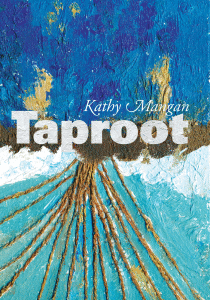I immersed myself in my friend Kathy Mangan’s poetry this week. In this new collection, each poem reaches deep into our common experience to bring out the bitter herbs and sweet blooms that crowd our lives. Reading them while watching my late sunflowers finally unfurling their fragile gold petals makes me consider the ground they have sprung from. I try to imagine what this patch of earth takes from the vast mantle of living soil that surrounds it, that we walk on every day, heedless, and what it gives back.
Mangan deftly welcomes us into each poem, ensuring that we find ourselves in that particular time and place. For example, “After Morning Visiting Hours in the ICU” begins:
The suck of the hospital’s revolving door thrusts
you into the stun of noon sun, and you stop at the corner,
squinting down Lombard Street —
You don’t have to have experienced Baltimore’s roasting summers to feel the heat here. Mangan’s strong verbs and vivid gerunds—suck, stun—surprise us even as the music of stresses and internal rhyme lulls us into a daze.
The title of “Portrait in a Foreign Flat” begins our orientation, while the first lines make it specific:
Before I knew anything;
she was simply the sweet blond
girl in the gilt-framed portrait
over the piano in the living room.
We know because of the first line and the “simply” in the second that we are in for a story, and Mangan does not disappoint. I could not help being stirred by the story that unfolds before returning to the portrait over the piano.
Each poem is like a miniature novel, an entire life in a single moment, each scene an emotional experience. These are the sort of poems that I delight in, poems where the personal becomes universal and the everyday opens to new revelations.
I especially enjoyed the marvelously titled “Instead of Preparing Your Morning Composition Class on MLA Documentation, You Want to Write This Poem.” The narrator’s reactions—sometimes warm, often hilarious—to specific things and people encountered on her walk to work, bounced against footnote rules, delighted me.
Whether she’s writing about little things like a grandchild’s fantasy game or watching a son take the ice for a hockey game, or big things like illness and death, Mangan finds a new way into them, a way to bring them directly to our consciousness. We grieve with her; we celebrate with her.
Most of all, we remember our own joys and losses with sudden clarity. These poems give us our lives back.
What poets have you read who have opened your eyes to the world around you?
